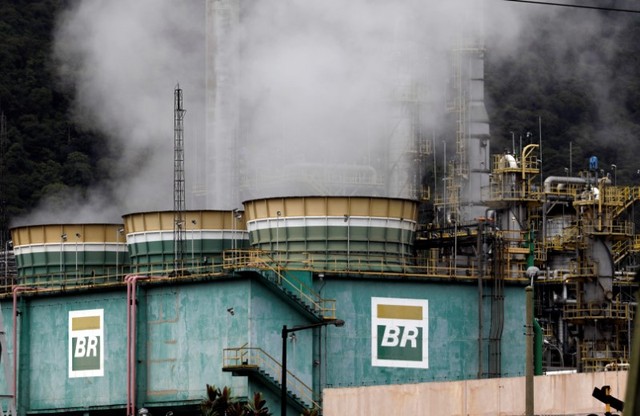
(Reuters, 26.Mar.2020) — A move by Brazil’s Petrobras on Thursday to slash output, capital spending and dividends brings the state-run oil firm into alignment with global rivals confronted with a global pandemic and a plunge in crude prices.
But a cloud remains over the company’s ambitious divestment drive, which is a key element of the current management’s strategy.
Petrobras has thrilled investors over the last two years with its rapid-fire sale of dozens of non-core assets, as the company’s management pushes to drive down debt. But the oil crash has put the brakes on that ambitious divestment push for now and some already announced deals could fall apart, according to several industry sources.
Brazil-listed preferred shares in Petroleo Brasileiro SA, as the firm is formally known, are off over 50% this year, among the worst performers of all major, publicly listed oil companies. Part of that drop is due to a general aversion to emerging market assets. But difficulty cutting debt certainly does not help, analysts say.
With $78.9 billion of net debt as of the fourth quarter, the company is sitting on one of the highest debt loads of all oil firms, equivalent to 2.41 times its earnings before interest, taxes, depreciation and amortization (EBITDA).
Petrobras’ formal goal is to reduce that ratio to 1.5 by the end of 2020. Soon after he was appointed in January 2019, Chief Executive Roberto Castello Branco even said the firm could reduce that ratio to 1 by aggressively selling off assets like refineries, pipelines and legacy oilfields.
Petrobras last year sold a bevy of assets including a major pipeline network and a stake in Brazil’s largest gas station chain.
But last week the company postponed by two months the sale of eight domestic refineries, a process set to rake in several billion dollars. At least one oilfield sale has also been pushed back, according to two sources familiar with the matter.
That has helped puncture some of the previous optimism surrounding the Brazilian oil behemoth.
“Previously, we viewed these (debt reduction) targets as feasible, if not a stretch, given the quick progress on asset sales and higher oil prices,” analysts from Morningstar said in a note published on Wednesday. “However, the recent decline in oil prices means the company is unlikely to reach its debt targets this year while asset sales might slow.”
In a conference call with investors on Thursday, executives played down the risks to their divestment program. Branco added, however, that the firm will not sell assets if offers come in below what the company considers to be fair valuations.
SALES POSTPONED
The oil price shock is not considered a dealbreaker for the refinery sales, in part because buyers are more concerned about crack spreads – or the difference in price between crude and refined products – than oil prices. Anelise Lara, Petrobras’ downstream chief, said she does not believe current oil prices and demand issues will affect prices for eight refineries the company has on the block.
But sources at two potential buyers have said they were at the least taking another look at their pricing assumptions.
Upstream deals are more at risk.
Binding offers for one mid-sized offshore oilfield that Petrobras is selling, Polo Garoupa, have been postponed until late April from early March, according to two sources with knowledge of the matter.
Several industry sources in Rio de Janeiro also raised concerns about the roughly $2.75 billion of divestments classified as “signed” but not “closed” by Petrobras as of February. At least one of the larger oilfields that fall into that category was purchased by a buyer still lining up financing.
Australia’s Karoon Energy Ltd, which announced the purchase of Petrobras’ Bauna field in July for $655 million, recently said it would no longer complete the expected loan package in the first quarter.
“Karoon is always looking to create value wherever it can be found for its investors and we will work through the current environment in an attempt to complete this acquisition,” Robert Hosking, Karoon’s managing director, said in a statement released earlier in March.
(Reporting by Gram Slattery; Additional reporting by Tatiana Bautzer and Carolina Mandl in Sao Paulo; Editing by Christian Plumb and Lisa Shumaker)
***

